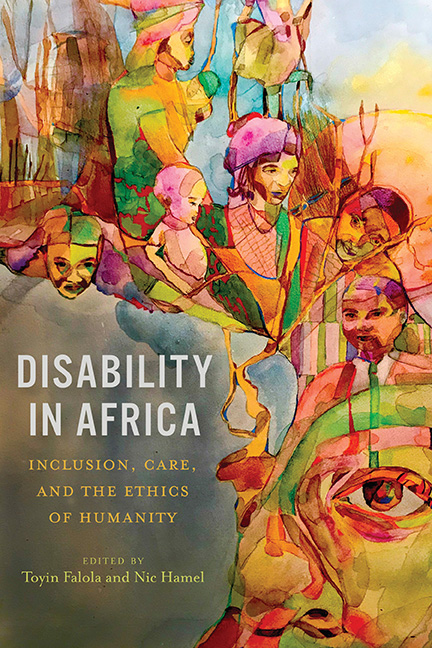Book contents
- Frontmatter
- Dedication
- Contents
- Part One Introducing the Field
- Part Two Theorizing Disability in Africa
- Part Three Representation and Cultural Expressions
- Part Four Education, Community, and Caregiving
- Part Five Activism and Barriers to Inclusion
- Conclusion: A Research Agenda for African Disability Studies
- Selected Bibliography
- Notes on Contributors
- Index
15 - So That the Stew Reaches Everybody: Women’s Negotiations of Leadership and Power in Ghana’s DPO’s
Published online by Cambridge University Press: 17 June 2021
- Frontmatter
- Dedication
- Contents
- Part One Introducing the Field
- Part Two Theorizing Disability in Africa
- Part Three Representation and Cultural Expressions
- Part Four Education, Community, and Caregiving
- Part Five Activism and Barriers to Inclusion
- Conclusion: A Research Agenda for African Disability Studies
- Selected Bibliography
- Notes on Contributors
- Index
Summary
The transformative potential of a movement is only as present as the strength or voice of the most marginalized.
—Emi KaneThis chapter reports on a qualitative study of disabled women's challenges and strategies in carrying out leadership roles in Ghanaian DPOs. A growing literature documents and theorizes experiences of disability oppression in Global South countries. Likewise, a growing body of literature explores policy needs and measures outcomes concerning disabled people in African countries. A smaller but growing literature documents the experiences, needs, and aspirations of disabled African women and economic disparities between disabled women and their male counterparts. Only a few studies, however, document the impact of DPOs in accomplishing social and policy change or influencing the lives and identities of their members. There is a dearth of literature on the internal power dynamics of DPOs and the challenges less-empowered members, particularly women, experience when they attempt to take leadership roles in these typically patriarchal organizations.
Women with Disabilities in Development and Human Rights Agendas
As other writers in this volume have illustrated, poverty, exclusion, and invisibility are pervasive for people with disabilities across the African continent. In Ghana, as elsewhere in Africa, people with disabilities live insecure and often shortened lives due to educational and economic exclusion, barriers to health care and transportation, underinvestment, low expectations of their families, and vulnerability to violence, harassment, and stigmatization.
In the late twentieth century, despite growing attention to disability as a form of inequality, girls and women with disabilities were rarely addressed at the policy level. Although specified as an underrepresented and “vulnerable group” by the UN Committee on Discrimination against Women General Recommendation 18 in 1991, disabled girls and women were not mentioned in the Convention on Discrimination against Women (CEDAW) and continued to be overlooked in national data collection and international development initiatives. This began to change with the Fourth World Conference on Women in Beijing in 1995, which saw vocal representation by women with disabilities from both Global North and Global South countries. The resulting document explicitly mentioned concerns of women with disabilities in a number of areas.
- Type
- Chapter
- Information
- Disability in AfricaInclusion, Care, and the Ethics of Humanity, pp. 319 - 342Publisher: Boydell & BrewerPrint publication year: 2021



